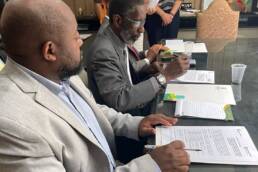
RIO DE JANEIRO, BRAZIL —
Council Ambassador to Brazil, Mr Rogerio Siqueira accompanied the Ambassador of Barbados to Brazil, H.E. Tonika Sealy-Thompson for a high-level meeting with the G20 Rio de Janeiro Summit Committee. In the spirit of cooperation and collective action leading up to the nineteenth meeting of Group of Twenty (G20), the Pan-African Council aims to emphasize Global South participation during the Summit with a special focus on Africa and the Caribbean.
The 2024 G20 Rio de Janeiro summit is scheduled to take place at the Museum of Modern Art (MAM) in Rio de Janeiro on 18–19 November 2024, the first G20 summit to be held in Brazil. The group that brings together 80% of the GDP of the world economy will meet in Rio over the course of a year.
The Brazilian presidency of the G20 officially started on December 1st, 2023, with President Luiz Inácio Lula da Silva as chair, under its theme being “Building a Just World and a Sustainable Planet”.
The country’s National G20 Committee was established on November 23, 2023. Lula highlighted the historic nature of this opportunity for Brazil –– and added that it is time for the agenda around combating inequality, hunger and poverty to be taken up for discussion with the world’s most important leaders. “It is no longer humanly possible to explain how the world can be so rich — that so much money crosses the Atlantic Ocean — and still so many people can be going hungry,” he said.
The Brazilian president also mentioned climate change as another of the country’s priorities in its leadership of the G20. “To Brazil, energy transition is an opportunity that we did not have in the 20th century. Now, in the 21st century, we can show the world that whoever wants to use green energy to produce what is necessary for humanity can come to Brazil: it is a safe haven where people may invest, helping to turn it into a developed country once and for all,” added Lula.
Lula also addressed the need for changes in the global governance system and in the way the true economic needs of developing countries are understood. it is no longer possible for Bretton Woods institutions, the World Bank, IMF and other financial institutions to go on functioning as if nothing were happening in the world, as if everything’s been solved,” he said.



